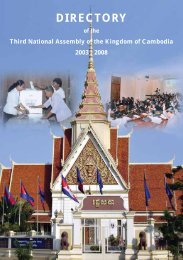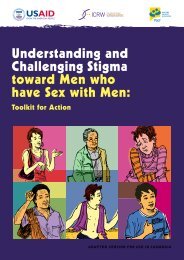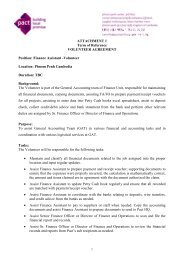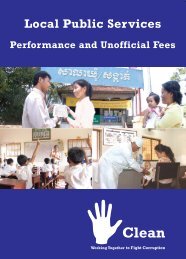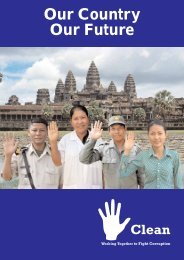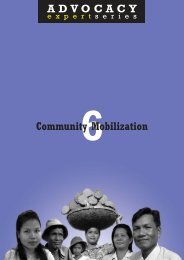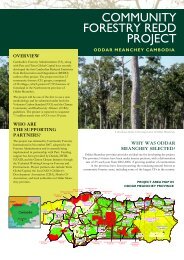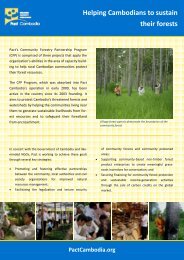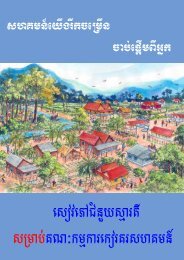Advocacy in Cambodia: Increasing Democratic ... - Pact Cambodia
Advocacy in Cambodia: Increasing Democratic ... - Pact Cambodia
Advocacy in Cambodia: Increasing Democratic ... - Pact Cambodia
Create successful ePaper yourself
Turn your PDF publications into a flip-book with our unique Google optimized e-Paper software.
level to <strong>in</strong>crease <strong>in</strong>teraction between district<br />
authorities and poor urban communities, but<br />
there has been little progress made <strong>in</strong> lobby<strong>in</strong>g the<br />
Municipality with regard to relocation and<br />
compensation policies. In the future, urban<br />
development organisations plan to support<br />
community <strong>in</strong>teraction with the newly elected<br />
Commune Councils, although the scope of power<br />
for the Commune Councils is not yet clear.<br />
Build<strong>in</strong>g Capacity of Community<br />
Organizations and NGOs<br />
ACHR, UNCHS, and other agencies have<br />
provided a number of capacity build<strong>in</strong>g<br />
opportunities for urban development workers,<br />
leaders of urban communities, and municipal<br />
authorities. With<strong>in</strong> the urban poor sector, the aim<br />
of capacity build<strong>in</strong>g activities is to enable<br />
organized communities, community leaders, and<br />
NGO staff to:<br />
• Get squatters compensation for evictions;<br />
• Help squatters f<strong>in</strong>d new opportunities to<br />
earn a liv<strong>in</strong>g (after evictions); and<br />
• Improve current facilities <strong>in</strong> urban poor<br />
settlements (sewage, dra<strong>in</strong>age, electricity,<br />
water).<br />
Capacity build<strong>in</strong>g activities have <strong>in</strong>cluded<br />
workshops, exposure trips, and exchanges<br />
between communities. An important strategy<br />
promoted by ACHR is understand<strong>in</strong>g alternative<br />
solutions to problems, such as alternative ways of<br />
identify<strong>in</strong>g land for relocations. Whenever<br />
possible, UNCHS helps communities to develop<br />
technical designs and awards <strong>in</strong>frastructure<br />
improvement contracts to communities <strong>in</strong>stead of<br />
contract<strong>in</strong>g with the private sector.<br />
One of the obstacles encountered by urban<br />
development groups is that do<strong>in</strong>g some of the<br />
work requires courage and a number of urban<br />
community development NGOs have lost their<br />
stronger staff. While community participation has<br />
improved, <strong>in</strong> general participation <strong>in</strong> <strong>Cambodia</strong><br />
is not as advanced as <strong>in</strong> other Asian countries. On<br />
the positive side, community members have come<br />
to understand that solidarity gives them power.<br />
Experts have observed an <strong>in</strong>crease <strong>in</strong> the<br />
capacity of urban NGOs and organized<br />
communities, particularly regard<strong>in</strong>g technical and<br />
<strong>in</strong>stitutional capacity areas, though some agencies<br />
criticize NGOs for th<strong>in</strong>k<strong>in</strong>g too much <strong>in</strong> the shortterm.<br />
Another weakness cited is that often urban<br />
groups only work and visit their target<br />
communities and as a result are unaware of<br />
problems - and achievements - that arise <strong>in</strong><br />
adjacent communities.<br />
At the grassroots levels, there are a few urban<br />
programs that aim to build capacity of groups<br />
other than the<br />
common urban<br />
committees.<br />
For example,<br />
USG’s Womens<br />
and Legal<br />
Rights program<br />
Experts have observed an <strong>in</strong>crease<br />
<strong>in</strong> the capacity of urban NGOs and<br />
organized communities, particularly<br />
regard<strong>in</strong>g technical and<br />
<strong>in</strong>stitutional capacity areas, though<br />
some agencies criticize NGOs for<br />
th<strong>in</strong>k<strong>in</strong>g too much <strong>in</strong> the shortterm.<br />
works with<br />
micro-vendors to assist them to negotiate with<br />
market committees and sangkat and khan<br />
officials. Although ma<strong>in</strong>ly <strong>in</strong>teract<strong>in</strong>g at the<br />
market committee level, micro-vendors are more<br />
active than before and are often aware of market<br />
development plans. The aim of the USG program<br />
is to network women across Phnom Penh’s<br />
markets and to advocate with a common voice on<br />
concerns that affect all vendors.<br />
Network<strong>in</strong>g<br />
The network<strong>in</strong>g capacity of the urban<br />
development sector rema<strong>in</strong>s weak. Reasons for<br />
network<strong>in</strong>g difficulties are lack of time and the fact<br />
that NGOs focus primarily on their <strong>in</strong>dividual<br />
programs. NGO directors are often unable to<br />
attend the plethora of meet<strong>in</strong>gs, workshops,<br />
sem<strong>in</strong>ars, and conferences. A number of<br />
professionals work<strong>in</strong>g <strong>in</strong> this field cite lack of<br />
solidarity as an explanation for weak network<strong>in</strong>g.<br />
It appears that urban groups implement<br />
activities without clear advocacy objectives. The<br />
NGO Forum work<strong>in</strong>g group on urban crisis is not<br />
an effective network and meet<strong>in</strong>gs do not usually<br />
result <strong>in</strong> action. One of the reasons is that<br />
participat<strong>in</strong>g organizations tend to send mid- or<br />
lower-level staff to the meet<strong>in</strong>gs who are not<br />
decision-makers and who may not have clear<br />
strategies or strong advocacy skills. Another<br />
challenge urban groups face is the large amount<br />
of time required to fulfill donor report<strong>in</strong>g<br />
requirements. Managers sometimes cite this as a<br />
reason that directors cannot attend meet<strong>in</strong>gs <strong>in</strong><br />
which their presence would make a difference.<br />
S<strong>in</strong>ce the Bondos Vichea fire, NGOs have<br />
realized that they need to improve their<br />
coord<strong>in</strong>ation. Recently, the NGO Forum has<br />
helped to host a Resettlement Action Network<br />
with participation from a small number of NGOs,<br />
<strong>in</strong> the hope that greater participation will<br />
strengthen the urban sector network.<br />
References<br />
Boonyabanch, Somsook, 2000. Bridg<strong>in</strong>g the F<strong>in</strong>ance Gap <strong>in</strong> Hous<strong>in</strong>g<br />
and Infrastructure: <strong>Cambodia</strong>, the Urban Poor Development Fund<br />
Case Study. Homeless International.<br />
Fallavier, Pierre, et al., 1999. Poverty Analysis <strong>in</strong> Phnom Penh. Action<br />
Nord Sud and UN Center for Human Settlements.<br />
Solidarity and Urban Poor Federation (SUPF), 1999. The State of<br />
Poor Settlements <strong>in</strong> Phnom Penh.<br />
Case Studies<br />
87



